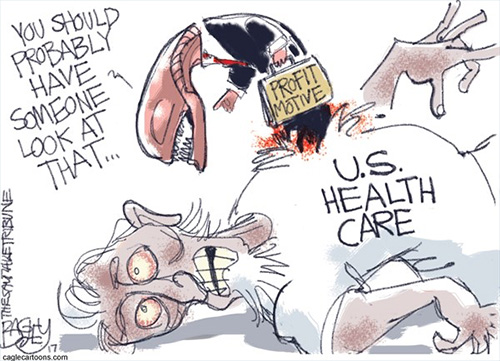
Ever Wondered Why Hospitals Don't Give Estimates?
By MICHAEL SHANNON
October 27, 2017
Friday PM
(SitNews) - If your goal was to design a system that guaranteed high prices, encouraged waste and discouraged price shopping there is no need to start from scratch. Just adopt the U.S. health insurance market and you're good to go.
 |
If we bought cars the way we buy healthcare it would work something like this. First you decide which car purchase policy to buy. Do you want a "bronze policy" that has a lower monthly premium, but a much higher deductible due when you pick up your new car? Which, by the way, is likely to be one of those suppository-sized Fiats, since that's the tier of car covered under bronze.
Or do you want to go for the "gold" policy that has much higher premiums, but also grants you the red-carpet treatment when you waltz into the Tesla dealership?
What's certain is, regardless of whether you opt for the suppository or the showboat, the final cost is immaterial. There's no window sticker glued to your new ride. No sitting on a metal folding chair in the salesman's cubicle while he "goes to check with his manager." There's not even any need to go to different dealers. Simply pick the one closest to home or the dealer with the best uppity coffee maker in the waiting room.
The dealer sends the invoice to the car purchase insurance company and you drive home. Price is no object when the company picks up the tab. Under that system we'd soon have two giant federal takeovers of the economy: ObamaCare followed by ObamaCar.
Health care pricing is totally opaque to the consumer and hospitals do their best to keep it that way. Constitutionally the federal government can't order hospitals to disclose prices. (I know this is no impediment to leftists, but conservatives must try to be consistent.) But it can require hospitals that take federal dollars to meet certain standards.
If the goal is to encourage competition while lowering prices, the standards would include posting turnkey prices on the web for the 25 most common surgical procedures; the 25 most common out-patient procedures and the 25 most common tests. The listed charges must also match the best price offered insurance companies.
That would be the beginning of real healthcare reform. Strangely enough the People's Republic of Maryland has taken a tentative step. The Washington Post reports the Maryland Health Care Commission has a website with the inane name of "Wear the Cost," which sounds like the surgery bill will be tattooed on your backside. Instead it compares turnkey prices for common procedures affecting patients who are either women, old or both.

Health Care Diagnosis
By Pat Bagley ©2017, Salt Lake Tribune |
Consumers can finally see what a hip replacement, knee replacement, hysterectomy and vaginal delivery prices are at 21 different hospitals. Niall Brennan, of the Health Care Cost Institute (HCCI), agreed with me when he told the Post,"[Medical] providers pretty quickly figured out that consumers were immune to the price of health care because it was all being picked up by insurance companies, which led to rapidly increasing prices."
Like whiskey drinkers, hospital patients associate high cost with high quality, which leads to hangovers in both instances. Take knee replacements. At the brand name Sinai Hospital a shiny new knee will set Blue Cross back $32,493.00. For that princely sum the patient risks almost a 15 percent chance of going back into the shop due to complications.
Meanwhile the University of Maryland Shore Medical Center at Easton - which for all I know is located in a Walmart parking lot - only charges $22,687 with a complication rate that's a fraction of Sinai's.
Healthcare "expert" Kevin Volpp doesn't believe information will make a difference. By his way of thinking, even if the knee was replaced in an abortion mill the cost would still consume the patient's entire deductible so the total won't matter. That overlooks co-pays. Twenty percent of Sinai's $32,493.00 is $6,498.00, while the co-pay on $22,687.00 is almost $2,000.00 less.
Smart insurance companies, probably an oxymoron, could seize the moment and offer reduced deductibles to patients who agreed to surgery in lower-cost hospitals, saving money for everyone involved and encouraging competition.
Naturally I had questions regarding this breakthrough. Namely, are there plans to get pricing data for more procedures? Does the commission intend to add out-patient surgery? How about prices for medical tests? And will males under age 65 ever find useful information?
Unfortunately, chairman Robert Moffit - evidently a Republican, since he formerly worked for the dreaded Heritage Foundation - and his staff were "too busy" to respond, so the answers to those and other questions remain unknown.
What we do know is this initiative is an excellent start. Let's hope the hope the hospital-industrial complex doesn't manage to kill it.
© Copyright 2017 Michael Shannon, distributed by Cagle Cartoons newspaper syndicate. Michael Shannon is a commentator and public relations consultant, and is the author of "A Conservative Christian's Guidebook for Living in Secular Times."
He can be reached at mandate.mmpr@gmail.com |
Representations of fact and opinions in comments posted below are solely those of the individual posters and do not represent the opinions of Sitnews.
Publish A Letter in SitNews
Contact the Editor
SitNews ©2017
Stories In The News
Ketchikan, Alaska
|
Articles &
photographs that appear in SitNews may be protected by copyright
and may not be reprinted without written permission from and
payment of any required fees to the proper sources.
E-mail your news &
photos to editor@sitnews.us
Photographers choosing to submit photographs for publication to SitNews are in doing so granting their permission for publication and for archiving. SitNews does not sell photographs. All requests for purchasing a photograph will be emailed to the photographer.
|
|


